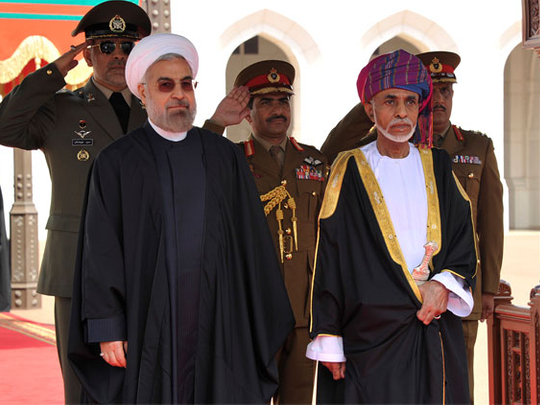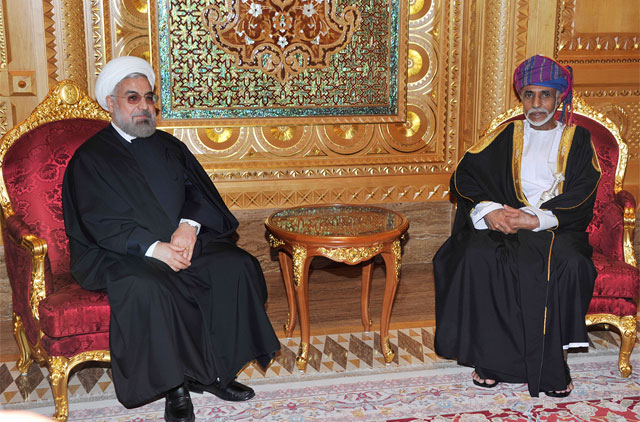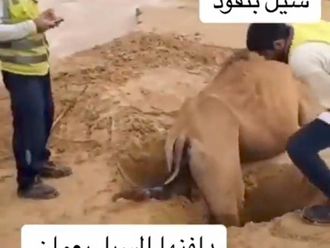
Muscat: Iranian President Hassan Rouhani arrived in Muscat on Wednesday for a visit dedicated to talks with leaders of the Islamic republic’s historic ally in the Gulf on regional tensions and bilateral cooperation.
Rouhani was greeted on arrival at the royal airport in Muscat by Oman’s deputy prime minister for the council of ministers, Fahd Bin Mahmoud Al Said, the Oman News Agency reported.
He then headed to the Alam palace in eastern Muscat to meet Sultan Qaboos, who has acted as an intermediary between Western countries and the Islamic republic.
The sultanate is reported to have hosted secret talks between Iran and the United States ahead of the signing in Geneva last November of an accord between world powers and Iran on its nuclear programme.
A government official said Rouhani was also to hold talks on Wednesday with senior Omani officials, the sultanate’s top cleric Ahmad Al Khalil and local businesspeople.
Before departing Tehran with a delegation of Iranian ministers for the two-day visit, Rouhani hailed the “good relations” that exist between Tehran and Muscat. “During this trip, we want to implement contracts (signed) in the field of trade and economy, especially those linked to oil and gas,” as well as in finance, banking, and culture, he told reporters at the airport, as cited by the official IRNA news agency.
“This visit is of great importance to strengthen relations between Iran and Islamic countries, especially those neighbouring Iran,” he added.
“The Strait of Hormuz gives countries south of the [Arabian] Gulf and the Arabian Sea great importance,” Rouhani said. Rouhani is the second Iranian leader to visit Oman since the 1979 Islamic Revolution. His hardline predecessor Mahmoud Ahmadinejad visited the sultanate in 2007.
A high-ranking economic delegation is accompanying him on the two-day visit aimed at boosting bilateral relations between the two countries. The delegation includes Mohammad Jawad Zarif, Minister of Foreign Affairs, Bijan Namdar Zanganeh, Minister of Oil, Abbas Akhoundi, Minister of Road and Urban Development, Ali Rabie, Minister of Cooperatives, Labour and Social Welfare, Mohammad Nahavandian, Head of the Presidential Office, Hussain Fredoun, Special Assistant to the President for Executive Affairs, Masoud Soltanifar, Vice-President and Head of the Cultural Heritage, Tourism and Handicrafts Organisation (CHTHO), Masuma Ibtikar, Vice-President and Head of the Environment Protection Organisation, Waliullah Saif, Chairman of the Central Bank, Ali Akbar Sibeveih, ambassador of the Islamic Republic of Iran to the Sultanate, Hussein Amir, Deputy Foreign Minister for Arab and African Affairs and a number of Iranian officials.
Iran and Oman lie on opposite sides of the strategic Strait of Hormuz, the waterway at the mouth of the Persian Gulf that is the route for one fifth of the world’s oil.
Saudi Arabia and other Western-allied Gulf Arab nations are wary of Iran’s influence. Oman has traditionally had warm relations with Iran and has at times acted as a mediator between Tehran and the West.
- With inputs from AFP and ONA













